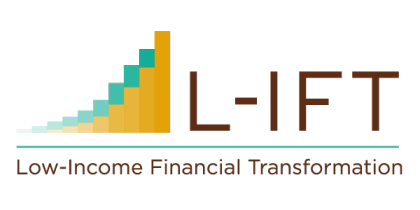In Uganda, there has been many efforts to raise awareness about COVID-19 to halt the spread of the virus. But, how much information has reached refugees about protecting themselves and others from the virus? And to what extent has false information taken root?
To check the level of awareness about COVID-19 among refugees, L-IFT asked 149 refugees in Nakivale and Kiriyandango refugee camps about their knowledge of corona virus transmission, the symptoms of COVID-19 infection; whether the symptoms differ between flu related respiratory symptoms and COVID-19 infection and how they wash their hands to prevent the infection. This interview took place from April 7th to April 22nd and the lock-down has started in the beginning of April.
Knowing the ways in which the virus is transmitted is important to be cautious and apply the preventive measures. Most of the refugees said, they have knowledge about how COVID-19 is transmitted (23 percent said, ‘very much’ and 50 percent said, ‘somehow’) while some of them said ‘not so much’ knowledge (10 percent) and a few said ‘not at all’ (8 percent).
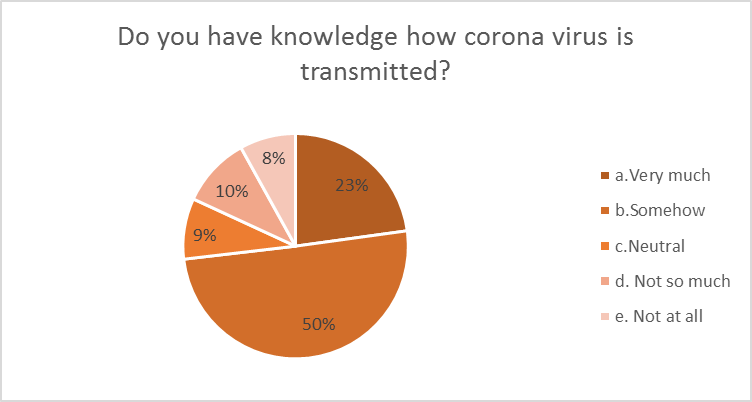
The most common symptoms of COVID-19 according to the refugees include fever (81 percent of the respondents), cough (82 percent), respiratory distress (50 percent), sore throat (48 percent), fatigue/weakness and muscle pain (30 percent). Only very few thought nausea/stomach pain (7 percent) were part of Covid-19’s symptoms. Only very few identified symptoms of swelling of eyes and the body changing to yellow which are probably not typical features of Covid-19. One person also said it does not show any symptoms which could be true if the person is thinking of asymptomatic people. About 9 percent of the respondents said, they don’t know the symptoms.
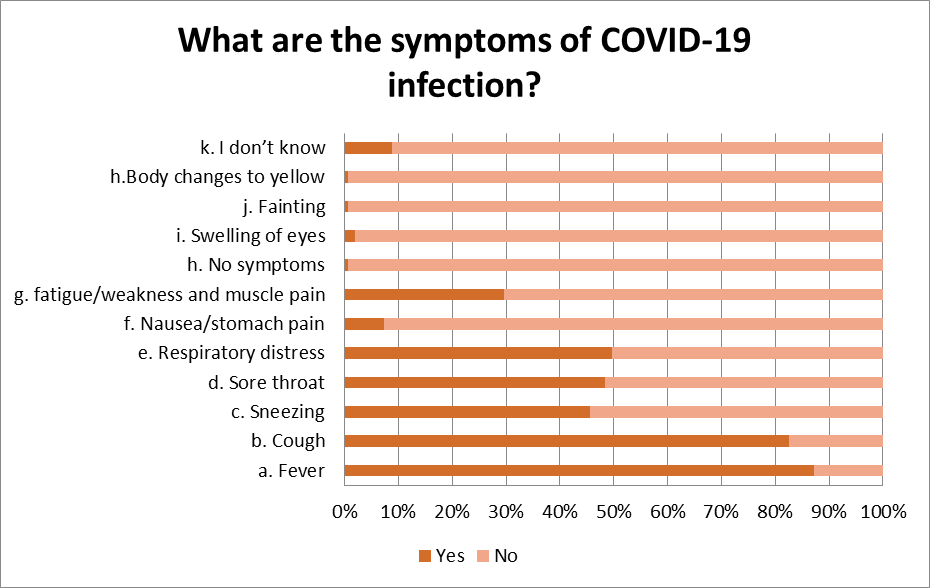
When we asked if there is a difference between flu related respiratory symptoms and COVID-19 infection, most of the refugees said there is a difference (74 percent) whereas some of the refugees said it is the same (9 percent), and 16 percent had no idea.
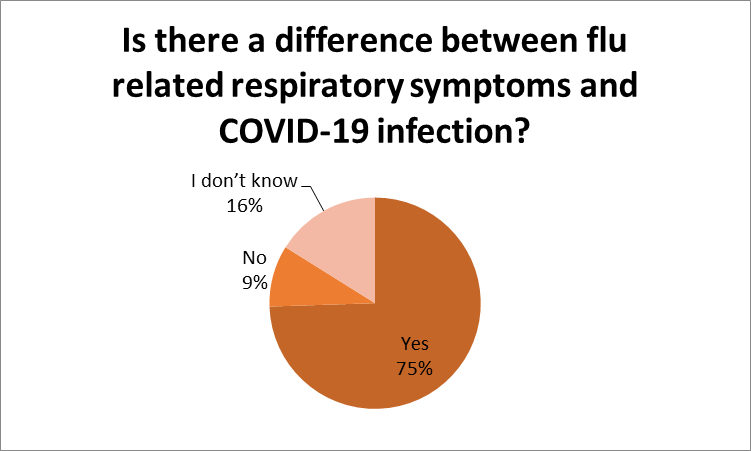
Those respondents who said there is a difference were asked for the specifics. Most of them said that COVID-19 was more severe (65 percent), hurts people with other disease more (43 percent), hurts older people more (42 percent), higher death rate (41 percent) and often causes pneumonia (37 percent) which all align with the facts known about corona virus.
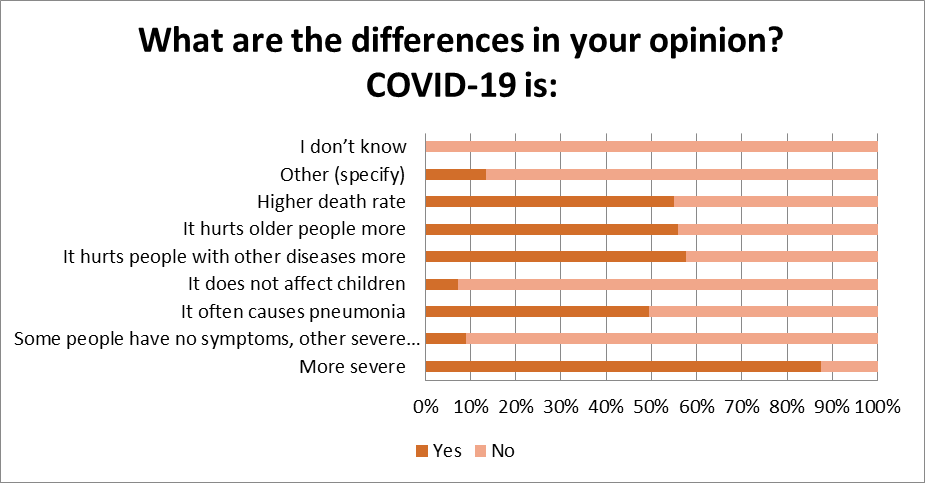
Since one of the preventive measures is to wash hands, we asked the refugees how they wash their hands. In this question, the respondents could select several options. About half of the respondents (51 percent) said, they wash their hands with soap for 20 seconds and 24 percent of the respondents said, they clean their hands with alcohol based solutions. These two forms of washing hands are according to what WHO recommends. Nevertheless, many refugees said to wash hands for about 10 seconds (40 percent) which WHO states to be insufficient. Some report cleaning hands with only water (10 percent) which does not help much in killing the virus. This shows that behaviour is for about 40 percent a little short of safe and for 10 percent far removed from what is safe. Whether this behaviour is due to lack of information or more for lack of resources or just lack of dedication, we don’t know.
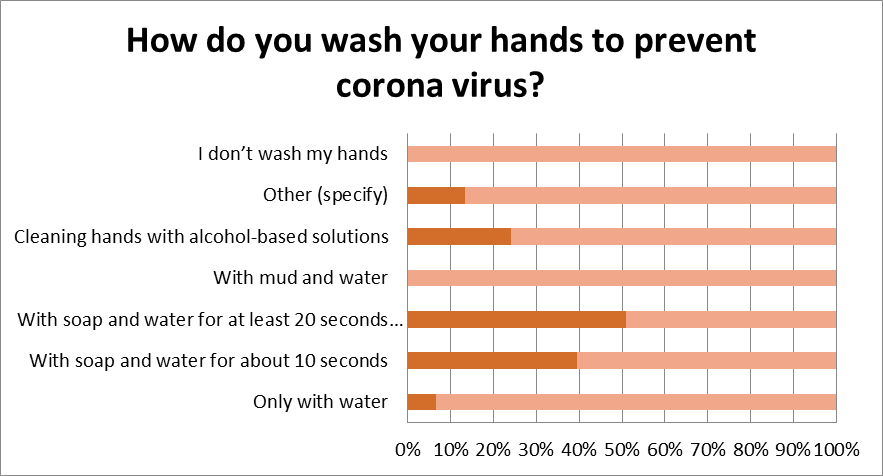
The majority of the refugees have concrete, relevant knowledge about the virus and overall adhere quite well to the recommended prevention methods. There are practically no cases found of misinformation. A little boost to the duration of washing hands may further protect the refugee communities.
By: Mahlet Alemayehu
This blog is written using data from the RISE project, funded by Opportunity International, with consulting services from PHB.
PHB collaborates with international development agencies, banks, regulators and other impact makers around the world to assess, implement and scale digital interventions. We leverage the expertise of our team to support the design of digital finance ecosystems that can strengthen the resilience of communities in need. To learn more about PHB activities, publications and training, visit www.phbdevelopment.com
